Mon 26 May 2014
A Movie Review by Jonathan Lewis: THE HEROES OF TELEMARK (1965).
Posted by Steve under Action Adventure movies , Reviews , War Films[3] Comments
THE HEROES OF TELEMARK. Columbia Pictures, 1965. Also released as Anthony Mann’s The Heroes of Telemark. Kirk Douglas, Richard Harris, Ulla Jacobsson, Michael Redgrave. Director: Anthony Mann.
The Heroes of Telemark, directed by Anthony Mann, is both a drama and action film about the Norwegian resistance during the Second World War. Filmed on location, it is one of Mann’s (Winchester ’73, El Cid) last movies.
Film historian Jeanine Basinger, while not oblivious to its flaws, rightly categorizes The Heroes of Telemark as “a grand, epic adventure with moments of incredible tension.†The DVD version, with its widescreen ratio, is perhaps as close as one can get at home to the experience of watching it in a movie theater.
The film’s plot, loosely based on actual events, centers around two characters, Oslo university physicist and womanizer turned resistance fighter, Rolf Pedersen (Kirk Douglas looking consistently angry and determined) and Knut Straud (a character portrayed by Richard Harris and based on American-born Norwegian resistance leader, Knut Haukelid).
Assisting them are Pedersen’s ex-wife, Anna (Ulla Jacobsson) and her uncle (Michael Redgrave). Their mission: to destroy a heavy water plant in the Norwegian county of Telemark that the Nazi occupying forces are utilizing in their race to develop atomic weaponry before the Allies are able to do so. The fate of the world depends upon them, and they know it.
The Heroes of Telemark is not simply an action film. It’s also a character study of Pedersen, a reluctant hero. When we first encounter him, he’s in his laboratory in Oslo engaged in a dalliance with a student. He is initially hostile to the Resistance, blaming Straud and others for provoking Nazi retribution tactics against Norwegian civilians. He only joins the cause when he learns what the German invaders are up to in Telemark.
Complicating matters are his still strong romantic feelings for his ex-wife (Jacobsson). Pedersen also repeatedly butts heads with Straud over the best methods by which to achieve their goals. Pedersen is much more ruthless than Straud and cares far less about so-called collateral damage. This will change by the time the film ends, with Pedersen regaining some of the humanity he lost in his ruthless fight against the Nazis. Overall, Douglas is successful in this role, even if his portrayal of the hotheaded Pedersen does begin at times to feel a bit one-dimensional.
Aside from the strong plot, the film benefits from often stunning imagery and visuals. The scenes shot on location in Norway are quite spectacular. There are also numerous shots of bridges, motor vehicles, ships, staircases, and doorways. All of these are, of course, man-made creations that provide stark contrasts to the region’s snow covered natural beauty.
There’s one scene in particular that merits close attention. This occurs toward the end of the film with a black train is pulling into a station, set to board a ferry. Look, in particular, for the red light shining onto the white snow, the white steam rising from the train’s engine, and the small, but noticeable yellow light at the front of the train. Little details such as these give the film an immediacy that is lacking in all too many contemporary films that rely too heavily upon special effects to deliver visual messages.
Sound also plays a prominent role in the film, be it the aforementioned train’s whistle, the ticking of bombs, or the dripping of heavy water in the plant (also a strong visual). The buzz of the ferry’s engines, again at the end of the film, is also very noticeable.
In conclusion, The Heroes of Telemark is worth watching. Those familiar with Alastair McLean’s oeuvre might especially appreciate it. The history of Nazi Germany’s quest to develop the atomic bomb has been largely forgotten. Yet it remains an important chapter in the history of the Second World War, along with the story of the Norwegians who sacrificed their lives and homes to stop the heavy water project.
The Heroes of Telemark isn’t one of the best war films ever made, but it’s still a very good one.
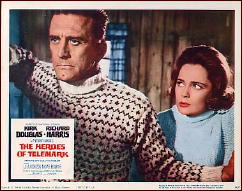
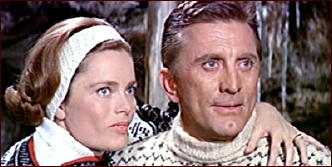
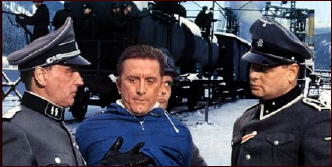
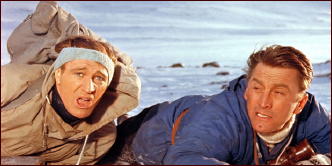
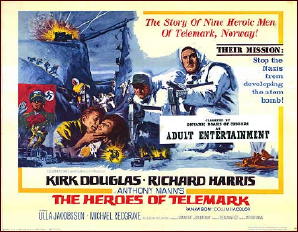
May 26th, 2014 at 1:45 pm
It’s a decent movie in itself, but it’s not really about the real life events. I know that some of the real ‘Heroes of Telemark’ have described it as ‘pure Hollywood nonsense. Given that it’s such an vitally important mission, and a turning point in the war, it’s a shame that they couldn’t have made it a little closer to reality. Despite some lovely visual touches, the script does cleave to a lot of 60s war movie cliches. As soon as you know that the heroine is Pedersen’s ex-wife, you can pretty much write one of the sub-plots yourself.
May 26th, 2014 at 2:44 pm
As Bradstreet says the ‘true’ aspect of this is that some of the people had actual counterparts and we did blow up the German heavy water supplies.
On the other hand we blew them up for the wrong reason. We believed the Germans must be working on the bomb because we were, but the fact was they were not. They needed the heavy water for their rockets.
Nils Bohr tried to tell the allies that because his friend Heisenberg had shown him his equations proving the bomb was impossible, and Heisenberg was in charge of the German nuclear program. Bohr didn’t bother to point out Heisenberg had made a simple mistake in math and gotten the wrong result — if I recall Heisenberg literally forgot to carry a single number over.
It was instead the Japanese who were working on the bomb and doing fairly well with it albeit with far less success and resources than the Allies.
That doesn’t effect this being an entertaining film, though I recall some critique of that epic bit being a bit cumbersome at the time. Mann was struggling with the critics and audiences at this time since, entertaining as they were, big epic movies were not what he did best. The best things about his epics are usually on the small scale, well drawn characters and story elements that tend to get lost in the big picture.
His films were still often major hits at the box office, and more intelligent than most, but he was not getting the kind of critical praise he had for his tight smart westerns and taut dark film noir outings. For my money he didn’t make another great film after Man of the West with Gary Cooper.
May 26th, 2014 at 3:33 pm
I think many people would agree that while Mann’s “epics” are indeed nowhere near as good as his earlier films, though they do remain a significant part of his overall output.
Overall, the film does have a very 1960s war film feel to it. I actually didn’t mind the Pedersen/ex-wife subplot as much as I thought I might. It was, in some ways, a distraction from the overall plot, but if you look at the film as a character study based *loosely* — very loosely — on historical reality — then it makes sense